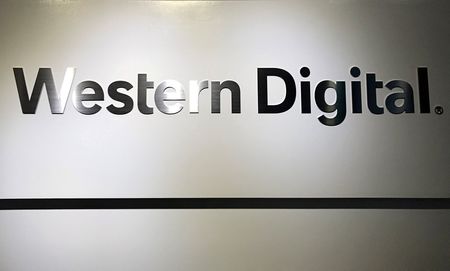By Samrhitha A and Aditya Soni
(Reuters) -Western Digital said on Monday it would spin off its flash memory business that has been grappling with a supply glut after talks of merging the unit with Japan’s Kioxia stalled, and also announced a fresh capital raise to refinance some of its debt.
The split will leave the data storage products maker with its traditional hard-disk drive business and create two publicly traded firms, giving into demands from activist investor Elliott, which said on Monday it supports the move.
Western Digital shares closed 7.3% higher at $41.80 on the news, but fell about 6% in extended trading after it announced it planned to raise capital through the sale of $1.3 billion worth of convertible bonds, due 2028. The company said it would use the proceeds to refinance a portion of its debt due 2024.
The split clears years of uncertainty over Western Digital’s flash memory unit that was built through its $19 billion purchase of SanDisk in 2016 and caters to the smartphone and computer industries.
Demand for flash chips has slumped after the pandemic, leaving the market awash in supply and increasing the pressure on chipmakers to consolidate.
Since 2021, Western Digital and its manufacturing partner Kioxia have been in talks for a merger that would create a company that controls a third of the global NAND flash market.
The latest attempt at the deal stalled last week after opposition from Kioxia investor SK Hynix, which is a major memory chip maker and rival to both firms, sources told Reuters.
“Given current constraints, it has become clearer … that delivering a stand-alone separation is the right next step in the evolution of Western Digital,” CEO David Goeckeler said on Monday.
The company, which also reported quarterly results, did not give more details on the talks with Kioxia during its post-earnings call.
But it said it remains open to any alternatives that deliver “superior value” to the planned separation, which is tax-free and targeted for the second half of 2024.
Kinngai Chan, analyst at Summit Insights Group, ruled out any other approaches for the flash memory business. “We are not expecting any other company to bid,” he said.
Western Digital forecast a second-quarter loss that was smaller than Wall Street estimates. It also posted better-than-expected results for the July-September period as the pace of declines in its flash business slowed.
(Reporting by Samrhitha Arunasalam and Aditya Soni in Bengaluru; Editing by Shounak Dasgupta and Krishna Chandra Eluri)

